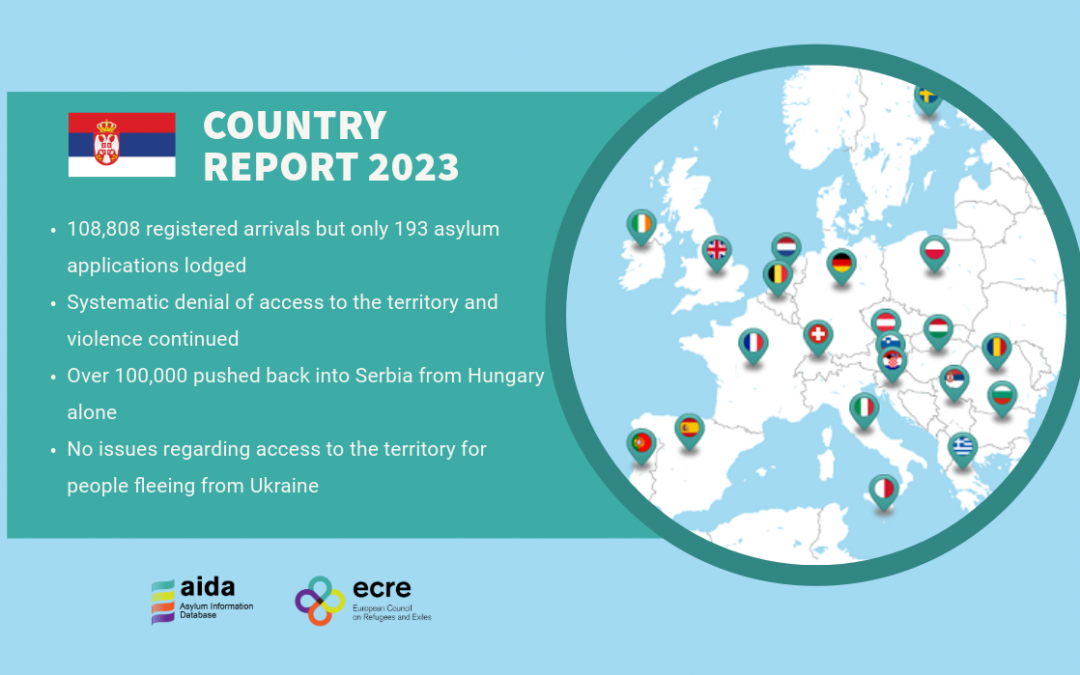The updated AIDA Country Report on Serbia provides a detailed overview of legislative and practice-related developments in asylum procedures, reception conditions, detention of asylum seekers and content of international protection in 2023. It also includes an annex which provides an overview of temporary protection (TP).
In 2023, 108,808 arrivals were registered in Serbia (slightly fewer than in 2022). However, only 1,654 people officially registered asylum applications and only 193 then lodged a first-time asylum application, thus confirming the trend of Serbia mainly being a transit country.
A significant number of Russian and Ukrainian citizens continued to arrive in Serbia in 2023. However, their legal status was mainly regulated outside the Asylum Act. The Asylum Office delivered 111 decisions concerning 154 asylum applicants in 2023. 36 decisions regarding 50 applicants were rejected on the merits, while six decisions resulted in asylum being granted to nine applicants. Most decisions resulted in the procedure being discontinued due to applicants having absconded. At second and third instances, most cases were rejected. In addition to continued concerns regarding the quality of the credibility assessment at first instance and the effectiveness of appeal processes, stakeholders also highlighted issues regarding the quality of legal aid, which may impact both access to the procedure, status determination at first instance and access to effective appeals.
Access to the territory and to the asylum procedure remained extremely difficult in 2023. People continued to be subjected to numerous human rights violations at the border by the Serbian Border Police, including arbitrary deprivation of liberty, ill-treatment, expulsion without examination of individual circumstances and risks of refoulement etc. Pushbacks notably occurred towards Bulgaria, Montenegro and North Macedonia. In addition, numerous people were also subjected to pushbacks towards Serbia from neighbouring (notably EU) countries. According to the Hungarian authorities, at least 100,128 third country nationals were pushed back from Hungary alone towards Serbia in 2023 (and at least 388,753 since 2016). Pushbacks from Bosnia, Croatia and Romania were also reported on a daily basis.
Access to the territory and to the asylum procedure at Serbian airports (mainly Belgrade but also Niš and Kraljevo) was also a serious concern in 2023 due to worrying practices of refusal of entry and forcible removals of people in need of international protection. Refusal of entry practices took place in conjunction with arbitrary deprivation of liberty in transit zones where people were not allowed to access legal aid, were deprived of their personal phones and/or were denied the opportunity to lodge an appeal against the refusal of entry decision. In total, Serbian authorities made 1,664 decisions to refuse entry in 2023. Although this represented a decrease from 2022, it also occurred at the same time that Serbia reintroduced visa regimes for citizens of countries from which asylum applicants had arrived in previous years.
In stark contrast to these practices, there were no reports or recorded incidents regarding people fleeing Ukraine being denied access to the territory. TP was extended several times, most recently until March 2025. Of the 1,482 individuals who have been granted protection since March 2022, 746 benefited from extensions of their TP permits in 2023.
Finally, a few improvements were noted regarding the integration of people who were granted asylum as they now have the automatic right to work when they are recognised as beneficiaries of international protection (asylum applicants also automatically obtain the right after six months) without first going through a work permit procedure and its associated costs. In addition, people who have been granted protection can now apply for permanent residency, the final step before naturalisation, after three years. The first positive decisions on the matter were already delivered in early 2024. Also, following a European Court of Human Rights ruling, people who have been granted international protection can now access travel documents in Serbia, the first of which were issued in early 2024.
The full report is available here and the annex on temporary protection is available here.
For more information about the AIDA database or to read other AIDA reports, please visit the AIDA website.

